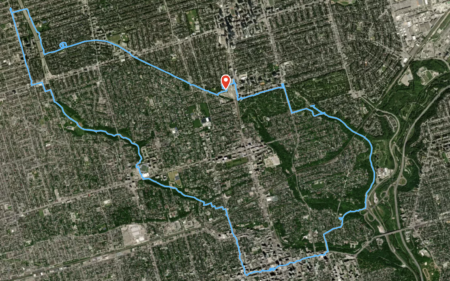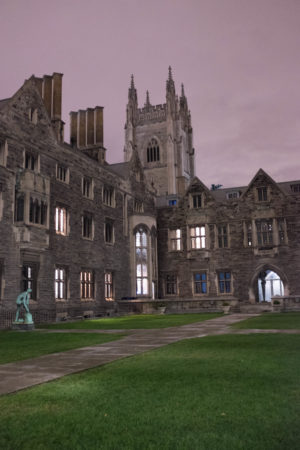Author: Milan
Khaleel’s marvellous PhD defence pop-up card
Books in progress at the end of 2022
As the University of Toronto’s willingness to let me extend and finish my PhD became more and more strained and conditional I set aside a large number of projects and tasks to focus on getting the dissertation done and defended in 2022.
Some of my books in progress relate closely to my PhD research. I have read most but not all of Britt Wray’s Generation Dread, which accompanies Connie Burk and Laura van Dernoot Lipsky’s Trauma Stewardship as a recent text on the psychological burden of environmental destruction and activism. I am reading George Hoberg’s The Resistance Dilemma: Place-Based Movements and the Climate Crisis and William K. Carroll’s Regime of Obstruction: How Corporate Power Blocks Energy Democracy. On broadening the coalition demanding climate action, I need to finish Katharine Hayhoe’s Saving Us. On system justification theory and the just world fallacy, I am reading John Jost’s Theory of System Justification and Left and Right: The Psychological Significance of a Political Distinction. On the psychology of contemporary politics I am also reading Pankaj Mishra’s Age of Anger: A History of the Present.
To help force myself through the final stages of writing up, I nearly finished William Germano’s On Revision: The Only Writing That Counts.
On energy I am still working through Robert Jaffe and Washington Taylor’s The Physics of Energy. Because it was recommended in that text, I have read most of Richard Garwin’s Megawatts and Megatons: The Future of Nuclear Power and Nuclear Weapons.
I most recently obtained Kieran Setiya’s Life Is Hard: How Philosophy Can Help Us Find Our Way — part of the informal reading I have been doing about modern stoicism and its relationship to the psychology of politics.
Related:
Beautiful and festive Christmas card from Antonia
Free dissertation release
Official versions are forthcoming on the University of Toronto’s TSpace thesis hosting platform and on paper from the Asquith Press at the Toronto Reference Library, but I see no reason not to make my PhD dissertation available as a free PDF to anyone who is interested:
I have been fighting for years to get this out into the world, so it makes no sense to wait for an arbitrary convocation date and then through further administrative delays.
If you are studying the fossil fuel divestment movement at universities or climate change activism generally in Canada, the US, and UK you may find the extended bibliography useful.
Persuasion and climate change politics
My PhD dissertation (which I am making the final pre-publication revisions on) is entitled: Persuasion Strategies: Canadian Campus Fossil Fuel Divestment Campaigns and the Development of Activists, 2012–20.
The title has several connections to the subject matter. 350.org and the other eNGOs who proliferated the divestment movement sought to persuade student activists to run campaigns with particular objectives; they did this in part to help persuade politicians and the public that the fossil fuel industry has become an enemy to humanity. Individual divestment campaigns tried to persuade their target administrations to divest, while also persuading students to join the group and consider their political messages. Activists were also heavily involved in trying to persuade one another to adopt particular views on what caused climate change and how to solve it. Finally, the title emphasizes how the task in divestment was persuading universities and other investors to act, not “forcing” them as some activists aspired to or claimed.
On this subject of persuasion, I listened to an episode of CBC’s Front Burner podcast “Can persuasion bridge the political divide?” with Anand Giridharadas. Giridharadas makes some very clever points that relate to the arguments of Kathy Hayhoe and others about how to win political support for climate change adaptation. I ordered Giridharadas’ book, and will hopefully be able to have some engaging discussions about it with friends who are working to develop and implement effective activist strategies.
AI that writes
Several recent articles have described text-generating AIs like GPT3 and ChatGPT:
- AI bot ChatGPT stuns academics with essay-writing skills and usability
- The Undergraduate Essay Is About to Die: Nobody is prepared for how AI will transform academia
I have been hearing for a while that the best/only way to deal with the enormous problem of plagiarism in university essays is to have more in-class exam essays and fewer take-home essays.
With huge classes and so many people admitted without strong English skills, it is already virtually impossible to tell the difference between students struggling to write anything cogent and some kind of automatic translation or re-working of someone else’s work. It’s already impossible to tell when students have bought essays, except maybe in the unlikely case that they only cheat on one and the person grading notices how it compares to the others. Even then, U of T only punishes people when they confess and I have never seen a serious penalty. If we continue as we are now, I expect that a decent fraction of papers will be AI-written within a few years. (Sooner and worse if the university adopts AI grading!)






